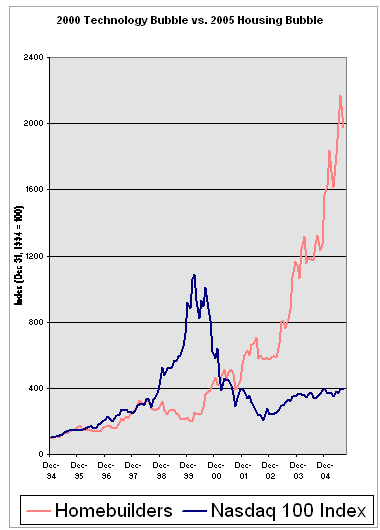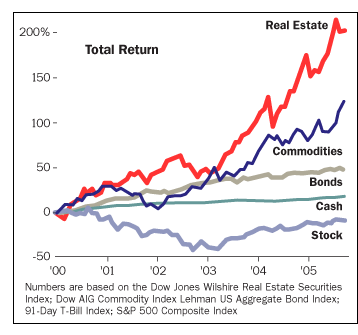

|
| weblog/wEssays archives | home | |
|
Cross Feedback Between the Stock and Housing Markets (September 28, 2006)  In his classic text
Irrational Exuberance
In his classic text
Irrational Exuberance
Internationally, home price booms show some tendency to peak a couple of years after stock market booms. This raises the possibility that there is sometimes cross feedback, that is, feedback from one market to the other, between the stock market and the housing market.In other words, a stock market boom generates a "wealth effect" which crosses over to the housing market. Fair enough. But what about a boom which crashes back to earth, as the NASDAQ market did in 2000? Shiller's questionnaire-based research found that: 
 This cross feedback may seem blindingly obvious, but it does lead us to ask: what
cross feedback might occur if both the stock and housing market roll over? Might
the dropping of prices in both markets start feeding back to each other? Where will people
put their money as both their stock and housing investments falter? Could the recent rise
of the bond market presage a flight to the apparent safety of bonds?
This cross feedback may seem blindingly obvious, but it does lead us to ask: what
cross feedback might occur if both the stock and housing market roll over? Might
the dropping of prices in both markets start feeding back to each other? Where will people
put their money as both their stock and housing investments falter? Could the recent rise
of the bond market presage a flight to the apparent safety of bonds?
The chattering classes are nearly unanimous in their expectation of deflation and a round of Fed rate cuts. Nice, but what if they're wrong? What if the inflation in non-discretionary spending and taxes which I have often described here (as opposed to the deflation found in discretionary items like restaurant meals) is embedded in the economy, merely masked by phony-baloney statistics which trumpet "inflation is dead"? What if the chart above reflects a reality which has been discounted, i.e. inflation is in a multi-year uptrend regardless of discretionary spending deflation? In other words: what if the Fed can't cut rates, as universally anticipated? Then what happens to bonds? They drop like stocks and housing. This is the cross feedback trifecta no one anticipates--no place to hide except maybe--maybe--gold and silver. For more on this subject and a wide array of other topics, please visit my weblog. copyright © 2006 Charles Hugh Smith. All rights reserved in all media. I would be honored if you linked this wEssay to your site, or printed a copy for your own use. |
||
| weblog/wEssays | home |